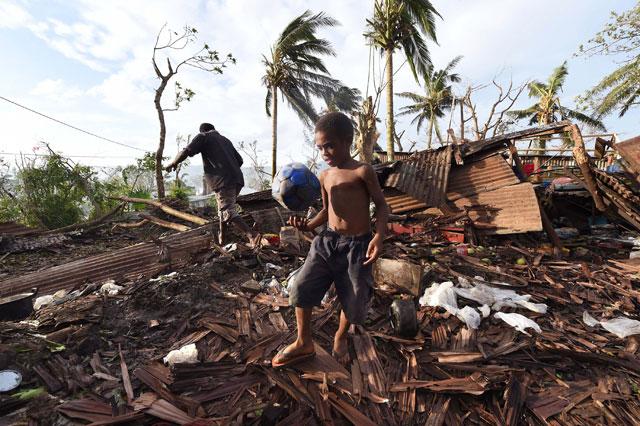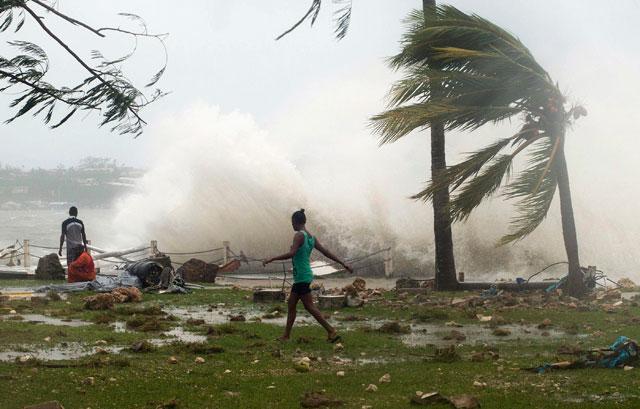You are here
Vanuatu president calls on world to help cyclone-ravaged nation rebuild
By AFP - Mar 16,2015 - Last updated at Mar 16,2015

PORT VILA, Vanuatu — Vanuatu's president pleaded with the world Monday to help the cyclone-ravaged Pacific nation rebuild its "completely destroyed" infrastructure as aid agencies warned conditions were among the most challenging they have faced, with fears of disease rife.
An emotional President Baldwin Lonsdale said the need was "immediate" after Severe Tropical Cyclone Pam tore through the country on Friday night packing winds of up to 320 kilometres an hour, leaving massive destruction.
In the capital Port Vila access to water was partially restored and stores began reopening, but entire neighbourhoods remained without power as aid workers streamed in to take the measure of what many have said might be one of the region's worst weather disasters.
"The humanitarian need is immediate, we need it right now," Lonsdale told AFP before flying home from a disaster conference in Japan, adding that the poverty-stricken island chain also desperately required longer-term financial support.
"After all the development we have done for the last couple of years and this big cyclone came and just destroyed... all the infrastructure the government has... built. Completely destroyed.
"We need international funding to [re]build all the infrastructure."
Many world leaders have pledged support. Military planes from Australia, New Zealand and France were arriving loaded with food, shelter, medicine and generators, along with disaster relief teams.
The official death toll in Port Vila, where aid workers said up to 90 per cent of homes have been damaged, stands at six with more than 30 injured, although there are fears this is likely a fraction of the fatalities caused by the storm.
'Quite frightening'
The nation's Prime Minister Joe Natuman was at home when the tempest hit.
"I tell you it was quite frightening," he told the Australian Broadcasting Corporation.
"It sounded like a big noise, you know. Throughout the night, big noise, thunder, lightning. When you looked out you couldn't see anything."
As aid flights continued landing, workers on the ground said there was no way to distribute supplies across the archipelago's 80 islands, warning it would take days to reach remote villages flattened by the storm.
Oxfam country director in Port Vila, Colin Collett van Rooyen, said a lack of clean water, temporary toilets, water purification tablets and hygiene kits needed to be addressed rapidly.
"Friday night was the first emergency with the arrival of Cyclone Pam, disease will be the second emergency without clean water, sanitation and hygiene provision," he said.
"There are more than 100,000 people likely homeless, every school destroyed, full evacuation centres, damage to health facilities and the morgue."
UNICEF said the storm may have affected up to 60,000 children, who are particularly vulnerable given the already poor nutrition rates in the impoverished country.
Trees, metal roof sheeting and all manner of debris littered Port Vila's roads, while at the beach, several boats were thrown on their side, an AFP reporter said.
The streets of the capital were virtually deserted as night fell, with authorities enforcing a 6pm curfew to prevent looting.
Charlotte Gillan, an Australian paramedic who lives in the village of Tango on the outskirts of Port Vila, said the front part of her house had collapsed.
"I fought tears seeing that devastation," she said, adding that disease was now her main concern.
'All that's gone'
"With all the rain and rubbish around, there's going to be malaria and dengue, as well as diarrhoea and vomiting with water contamination. People here are reliant on their gardens for food. But all that's gone."
Save the Children's Vanuatu director Tom Skirrow told AFP the logistical challenges were even worse than for Super Typhoon Haiyan, which struck the Philippines in November 2013, leaving more than 7,350 people dead or missing.
"I was present for the Haiyan response and I would 100 per cent tell you that this is a much more difficult logistical problem," he said.
"The numbers are smaller but the per centage of the population that's been affected is much bigger."
Skirrow said flights over remote islands in the archipelago, which spans more than 12,000 square kilometres, had confirmed widespread destruction elsewhere in the nation of 270,000.
Aid workers said it appeared the southern island of Tanna in particular suffered widespread damage.
Pacific nations regard themselves as at the frontline of climate change, given many are low-lying islands dangerously exposed to rising sea levels, and Lonsdale said changing weather patterns were partly to blame for the destruction.
The president of the Seychelles, James Michel, on Monday said Cyclone Pam was "a clear manifestation of climate change" and called on the international community to "wake up" to the impact of global warming.
Related Articles
A terrifying tropical cyclone which smashed into Vanuatu in the South Pacific wreaked widespread devastation, aid agencies said Saturday, raising fears that dozens may have died in what may be one of the region's worst weather disasters.
SYDNEY — A powerful earthquake that struck Vanuatu has killed 14 people, the Pacific nation's government said in a disaster update obtained
SYDNEY — Five Pacific nations on Thursday plotted how to prosecute a pivotal UN court case that aims to hold climate-polluting countries to












